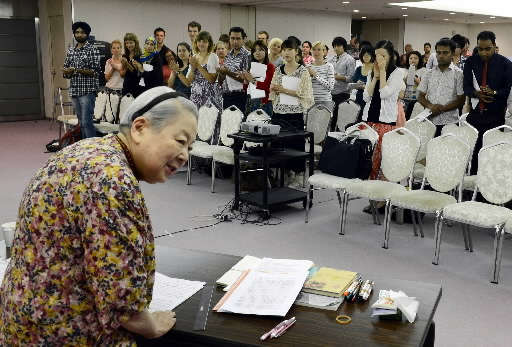IPPNW Student Congress in Hiroshima opens
Aug. 27, 2012
125 attend, discuss nuclear abolition
by Rie Nii, Staff Writer
A Student Congress being held in conjunction with the World Congress of the International Physicians for the Prevention of Nuclear War (IPPNW) got underway at the International Conference Center Hiroshima on August 22. Medical students and young doctors from 24 countries, including the United States, Russia, the United Kingdom, Indonesia, Nigeria and Iran are attending. The congress features a keynote speech by an atomic bomb survivor and workshops on various topics in an effort to further the debate on the abolition of nuclear weapons.
Hiroshima resident Masako Nakamoto, 89, a former obstetrician and gynecologist, was 22 at the time of the atomic bombing. She delivered the day’s keynote lecture in English. When the atomic bomb was dropped she was working at the offices of the Army Clothing Depot branch factory, which was located in the present Minami Ward, 2.7 km from the hypocenter. Ms. Nakamoto described how she helped the doctors and nurses at a clinic set up in the courtyard but felt helpless because she could do so little. It was this experience that made her decide to become a doctor.
Next there was a report on a bike tour from Nagasaki to Hiroshima. Forty Student Congress participants from 18 countries departed Nagasaki on August 9 for the 540-km bike ride between the two cities to raise awareness of the harmful effects of radiation and to call for the abolition of nuclear weapons. They arrived in Hiroshima on August 20.
At a workshop on the topic of “Hibakusha,” Tatsuya Aoki, a former resident of Fukushima Prefecture, gave a talk. Mr. Aoki, 38, and four members of his family moved to the city of Hiroshima from their home in Iitate after last year’s accident at the Fukushima No. 1 (Daiichi) nuclear power plant. Although the International Atomic Energy Agency had designated Iitate an evacuation area at the end of March, until April 11 the central and municipal governments continued to assert that the area was safe. Mr. Aoki was critical of the government’s response and said, “If nuclear power and people could coexist, I wouldn’t be here now.” Ajinkya Kale, 22, a medical student from India, listened intently to Mr. Aoki’s talk. She said that his account of the situation in Fukushima was far worse than the information she had heard up ’til then.
On August 23, the second and final day of the Student Congress, there will be more workshops and participants will announce plans for future activities before adjourning.
(Originally published on August 23, 2012)








